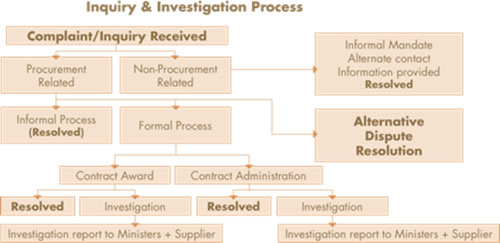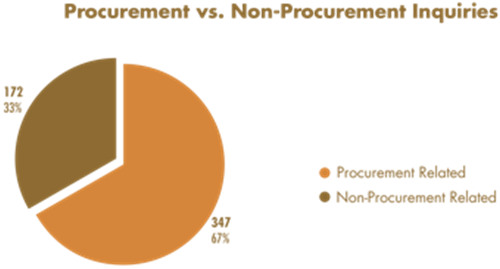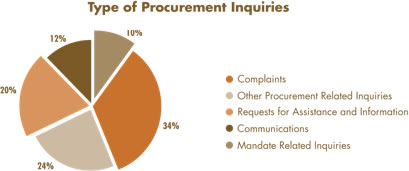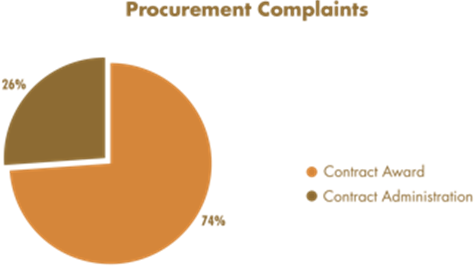Procurement Inquiries and Investigations
"My staff and I would like to thank you for your spectacular efforts in rectifying a disagreement (…) As a small, local Northern Ontario company, if your office had not intervened the consequences could have been very costly to our survival."
– D. Johnston, NORTHERN BUSINESS SOLUTIONS
The Inquiries and Investigations team plays a key role in the work of the Office of Procurement Ombudsman (OPO). It is the public face of the Office. This year, the team has successfully handled over 500 inquiries and complaints, a significant increase over last year. Recognized and respected by both suppliers and government, the team has experience in procurement and conflict resolution. By helping to resolve the issues between government officials and the supplier community, they strengthen confidence in public procurement.
Our business model encourages suppliers to try to resolve procurement issues directly with the relevant department first. If a supplier informs us that its request for clarification or information was unanswered or not fully answered, we encourage them to discuss their issues with us and allow us the opportunity to help resolve them as quickly as possible through informal means. Only if this does not work, do we proceed with a formal investigation. Both parties benefit from a collaborative approach as procurement processes continue in a timely manner, quality is not compromised and the parties maintain a good working relationship for future procurement contracts.
Suppliers can reach us by letter, e-mail or telephone call on the toll-free inquiries telephone line. When an inquiry is received, the investigator acknowledges the contact within one working day and stays with the inquiry until it is completed. Trust and efficiency are promoted by this commitment to personalized service. Feedback we have received indicate that people are pleased with the continuity and the fact that they do not have to tell their story over and over again.
In the course of our work, we are looking at a broad range of considerations but always balancing the interest of both parties. We are watching for indications that people were doing the right thing not just meeting the minimum required by the rules. We expect to see that all parties treat each other respectfully and take a thoughtful approach to procurement. For example we expect to see documented reasons for decisions that consider the broader context surrounding a particular transaction including ethical concerns.
What we are finding is that the root cause of most inquiries is misunderstandings between departments and their suppliers. What we hear from suppliers is that departments often give bureaucratic messages, conveying a minimum of information or feedback. Often this is the case, but sometimes it is also a case of the supplier not having a full understanding of the procurement process. Our investigators often describe the various parts of the procurement process in question which provides the supplier with an explanation sufficient to address their concerns. In our view there is much to be gained from clear, open and timely communication.

Text description of this Inquiry and Investigation Process Diagram is available on a separate page.
In 2009-2010, most inquiries were concluded without having to undertake a formal investigation or refer the case to Alternative Dispute Resolution (ADR). By working with our key contacts cooperatively, we have been able to ensure efficient and timely resolution of issues between the government and suppliers. With the issues resolved, suppliers can move forward with running their businesses and government officials can focus on running their operations. That we were able to conclude most inquiries informally is an important measure of our success in following a business model based on collegiality and communication.
This year, we noted that more of the supplier community seemed to know that we exist and what role we play. Callers were more aware of our mandate and had clearer expectations about how the Office could help them.
As illustrated in the chart, Procurement vs. Non-Procurement Inquiries, the Office received 519 inquiries in 2009-2010. Only 33 percent of the 519 contacts were non-procurement-related (for example, inquiries about late pension payments, alimony payments and housing). In these cases, the investigators explained that the issues were not within the Office's mandate. They did not dismiss these citizens' concerns but attempted to provide information on where the caller could get help, providing a name and telephone number when possible.

Text description of this Procurement vs. Non-Procurement Inquiries Diagram is available on a separate page.
We started using our Case Management System in 2009-2010, but the fact that 2008-2009 was a start-up and partial year, makes the comparison between the two years difficult.
347 of the 519 inquiries (approximately 67%) made in 2009-2010 were procurement-related. The nature of these procurement-related inquiries is:
- Complaints: concerns about the award or administration of contracts are a key focus for us. Helping to resolve these concerns is one of the most important roles the Office plays. Complaints represented 34 percent of all procurement-related inquiries.
- Other Procurement-Related Inquiries: procurement-related inquiries that do not fall within the legislated mandate of the Office. Examples include referrals to other levels of government, and systemic Government of Canada procurement issues that were referred to our Procurement Practices Review team.
- Requests for Assistance and Information: general information requests on procurement from suppliers, other government departments and Canadians.
- Communications: requests for the Procurement Ombudsman or other representatives of the Office to speak, to give interviews, or to submit articles to journals.
- Mandate-Related Inquiries: requests for information on the mandate of OPO, what it can or cannot do.
We encourage our stakeholders to inform the Office of all their procurement issues. This information can help the Office identify systemic issues and provide input for planning of future procurement practices reviews.

Text description of this Type of Procurement Inquiries Diagram is available on a separate page.
Complaints
As shown in the chart called Procurement Complaints, there are two broad categories for the 121 procurement-related complaints received in 2009-2010: contract award and contract administration.

Text description of this Procurement Complaints Diagram is available on a separate page.
Complaints on Contract Award
The Office of the Procurement Ombudsman can investigate:
- the award of a contract for the acquisition of goods below the value of $25,000 and services below the value of $100,000 where the criteria of Canada's Agreement on Internal Trade apply.
The Office of the Procurement Ombudsman cannot review:
- any complaint that falls within the mandate of the Canadian International Trade Tribunal or is the subject of a proceeding in court.
- any complaint that relates to problems that arose prior to the Procurement Ombudsman Regulations coming into force (May 5, 2008).
- any complaint related to contracts awarded where the government pursues a legitimate social objective, such as Aboriginal set-asides.
- any complaint about the procurement of certain government entities such as the Bank of Canada, the Canada Council and the Canada Deposit Insurance Corporation.
The issues brought to our attention in this category of complaints include unnecessary and restrictive selection criteria, lengthy or cancelled bidding processes, and biassed and inconsistent evaluation processes.
Initially, we use informal means to resolve complaints. The following cases show how the Office used its informal process to facilitate communication and achieve timely, efficient resolution of disputes.
- A supplier was not able to compete for a public procurement contract because of the technical specifications identified in a request for proposal (RFP). The company tried to set up a meeting with the government agency to explain its concerns and seek modification to the RFP. The agency officials refused to meet. The company then contacted our Office. Once we understood their concerns, we were able to assist in demystifying the procurement process. Subsequently the supplier was able to reframe his concerns which he sent directly to the agency. The agency officials agreed to a meeting. The specifications were modified, which meant that the company was able to successfully compete for this and future agency contracts. The supplier wrote the Office saying, "by allowing [our company] to compete, your office ensured the Government of Canada is receiving a high quality solution at a competitive price. The competition will ensure Canadian taxpayers receive the best possible value for tax dollars."
- A government agency wanted security cameras to photograph vehicles. In the $500,000 request for proposal (RFP), the agency included security clearances as a mandatory requirement. A potential supplier contacted the Office to complain that this restricted competition. We advised the supplier that we could not initiate a formal investigation because the high dollar value of the contract was outside the Office's mandate. However, we called the agency and through a simple discussion, the agency agreed that security clearances were not necessary. The agency then notified all potential suppliers that this requirement had been waived, which means this opportunity was opened to a much broader field of potential suppliers.
If we are unable to address the supplier's concerns using our informal process, we use the process set out in the Procurement Ombudsman Regulations. This year, two formal investigations were completed and three investigations on contract award were ongoing at year-end. Two cases are described below:
- A supplier complained about a mandatory technical requirement that restricted the openness of the solicitation process. During the solicitation process and afterwards, the complainant challenged the appropriateness of the mandatory requirement on the basis that it was restrictive and discriminatory. The complainant also was unable to obtain, despite several attempts, a rationale for including the mandatory requirement. In response to queries during the solicitation process, the tendering department simply refused to change the requirement and provided no explanation for it. Our investigation found that the mandatory requirement was a legitimate operational requirement of that particular solicitation process. However, we also agreed with the complainant that a rationale should have been provided in a timelier manner to potential suppliers.
- A supplier alleged that a requirement cancelled from one electronic bidding tool and re-advertised using another electronic tool but with much more stringent mandatory requirements in an attempt to exclude his proposal. Our investigation found that the department had carried out a fair competition and the supplier had been disqualified in accordance with the rules. However, our investigation also noted that the procurement files were poorly documented and the rationale for the tools selected and decisions made were not clearly stated.
In bringing these complaints to our attention, suppliers are contributing to a process which results in recommendations that are aimed at strengthening fairness, openness, and transparency of the procurement system.
Complaints on Contract Administration
The Office of the Procurement Ombudsman can investigate the administration of contracts irrespective of dollar amounts.
The Office of the Procurement Ombudsman may not make recommendations:
- altering the terms and conditions of a contract.
- providing a remedy other than as specified in the contract.
Where the other criteria in the Procurement Ombudsman Regulations are met, the Office can review complaints about the administration of a contract which includes issues such as late payments, no interest on late payments and standing offer (SO) extensions. Where the complaint centers on the interpretation or application of terms and conditions of the contract, we transfer it to the Alternative Dispute Resolution team.
The following two examples from 2009-2010 show how we resolved contract administration cases without the need to conduct formal investigations.
- A standing offer (SO) renewal notice was sent to a supplier at 4 p.m. on the day the SO was to expire. The supplier was traveling in Asia at the time and was unable to respond to the department for three days. On returning to Canada, the supplier requested the department make an allowance for his circumstances but the department refused to extend the deadline for returning the acceptance. The supplier then complained to our Office. We phoned the department and asked that it reconsider its position. Initially, the department took the position that what it had done was within the terms of the standing offer but failed to see it was neither ethical nor respectful. It had not considered the effect on suppliers of its decision to send the renewal notice on the last possible day. After we questioned the department's reasons for its decision, the department acknowledged its part in creating this difficulty and agreed to renew the SO with the supplier.
- A company complained that a department was late in paying its invoices. We called the department who apologized indicating that it was just implementing a new financial system. The company called us back to say that they had received payment but no interest had been paid. Subsequent to a further call from us, the department advised that the interest module on their new system had not been activated. The department fixed the system and paid the supplier the interest owed.
In 2009-2010, there were no formal investigations of contract administration complaints. Since many contract administration issues pertain to the interpretation or application of the terms and conditions of the contract, it is more likely the matter will be referred to the Alternative Dispute Resolution team who will assist the parties to resolve their disagreement quickly and respectfully so that the parties can maintain their working relationship to produce a quality result.
- Date modified: